外研社必修四 module 4 great scientists cultural corner and language points课件(共18页)
外研版高中英语必修四备课Module 4 Great Scientists素材传奇人物
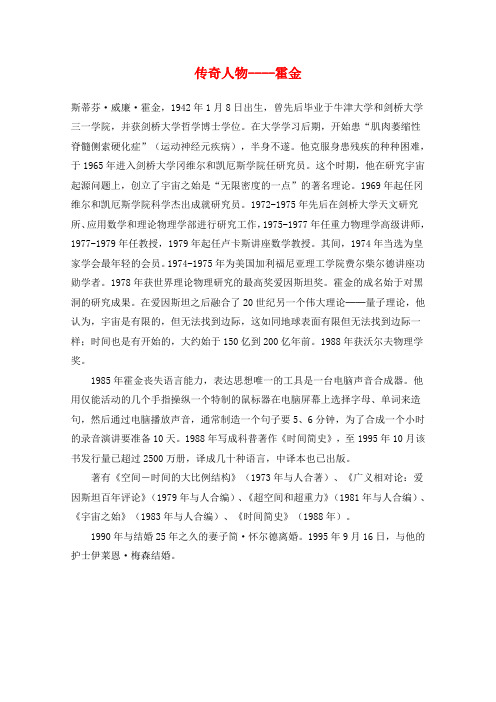
传奇人物----霍金斯蒂芬·威廉·霍金,1942年1月8日出生,曾先后毕业于牛津大学和剑桥大学三一学院,并获剑桥大学哲学博士学位。
在大学学习后期,开始患“肌肉萎缩性脊髓侧索硬化症”(运动神经元疾病),半身不遂。
他克服身患残疾的种种困难,于1965年进入剑桥大学冈维尔和凯厄斯学院任研究员。
这个时期,他在研究宇宙起源问题上,创立了宇宙之始是“无限密度的一点”的著名理论。
1969年起任冈维尔和凯厄斯学院科学杰出成就研究员。
1972-1975年先后在剑桥大学天文研究所、应用数学和理论物理学部进行研究工作,1975-1977年任重力物理学高级讲师,1977-1979年任教授,1979年起任卢卡斯讲座数学教授。
其间,1974年当选为皇家学会最年轻的会员。
1974-1975年为美国加利福尼亚理工学院费尔柴尔德讲座功勋学者。
1978年获世界理论物理研究的最高奖爱因斯坦奖。
霍金的成名始于对黑洞的研究成果。
在爱因斯坦之后融合了20世纪另一个伟大理论──量子理论,他认为,宇宙是有限的,但无法找到边际,这如同地球表面有限但无法找到边际一样;时间也是有开始的,大约始于150亿到200亿年前。
1988年获沃尔夫物理学奖。
1985年霍金丧失语言能力,表达思想唯一的工具是一台电脑声音合成器。
他用仅能活动的几个手指操纵一个特制的鼠标器在电脑屏幕上选择字母、单词来造句,然后通过电脑播放声音,通常制造一个句子要5、6分钟,为了合成一个小时的录音演讲要准备10天。
1988年写成科普著作《时间简史》,至1995年10月该书发行量已超过2500万册,译成几十种语言,中译本也已出版。
著有《空间-时间的大比例结构》(1973年与人合著)、《广义相对论:爱因斯坦百年评论》(1979年与人合编)、《超空间和超重力》(1981年与人合编)、《宇宙之始》(1983年与人合编)、《时间简史》(1988年)。
1990年与结婚25年之久的妻子简·怀尔德离婚。
外研版高中英语必修四Module 4Great ScientistsCulture Corner326张PPT课件ppt
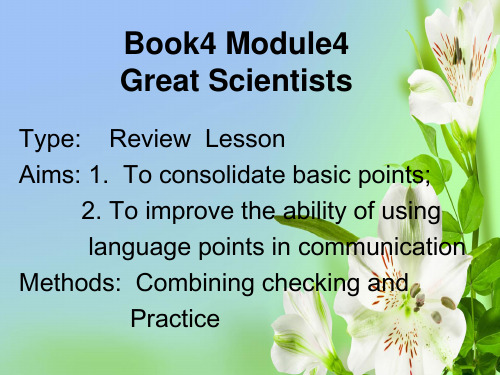
8. The children are the helpless v_ic_t_i_m_s__ of the fighting.
9. They all consider him to be a _b_r_il_li_a_n_t_ (才 华横溢的) writer.
• 1.----How do you deal with the disagreement between the company and the customers?
----T_h_e__k_e_y__to__s_o_l_v_in_g__th__e_p_r_o_b_l_e_m_ is to
4. To produce new plants or animals __b_r_e_e_d__
5. A plant which comes from two different plants _h_y_b_r_i_d___
6. To get free; get away _e_s_c_a_p_e_
3. Some s_p_e_c_ie_s__ of animals have become extinct because they could not adapt to the changing environment.
4. I live here now, but I wonder who lived here o_r_ig__in_a_l_ly_.
rice-growing:复合adj. 种植水稻的
n. +现在分词 与所描述的人或事物 之间是逻辑上的主动关系 eg. an English-speaking country;
a gold-mining group; a paper-making factory; peace-loving peoples
外研版必修4 module4 great scientists_教案精编版
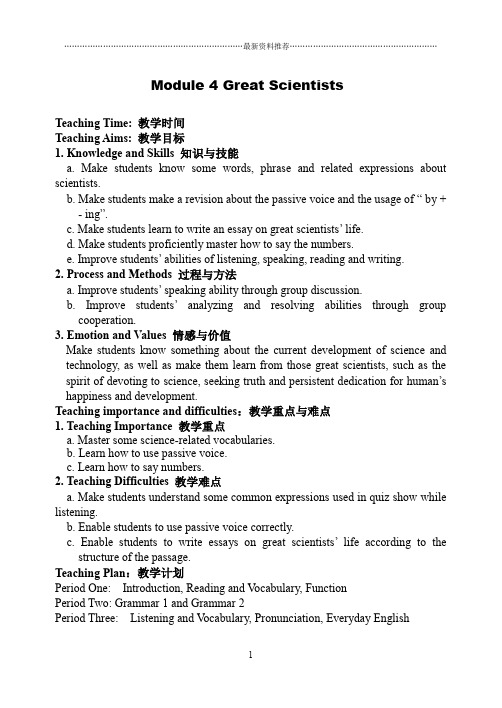
Module 4 Great ScientistsTeaching Time: 教学时间Teaching Aims: 教学目标1. Knowledge and Skills 知识与技能a. Make students know some words, phrase and related expressions about scientists.b. Make students make a revision about the passive voice and the usage of “ by +- ing”.c. Make students learn to write an essay on great scientists’ life.d. Make students proficiently master how to say the numbers.e. Improve students’ abilities of listening, speaking, reading and writing.2. Process and Methods 过程与方法a. Improve students’ speaking ability through group discussion.b. Improve students’analyzing and resolving abilities through groupcooperation.3. Emotion and Values 情感与价值Make students know something about the current development of science and technology, as well as make them learn from those great scientists, such as the spirit of devoting to science, seeking truth and persistent dedication for human’s happiness and development.Teaching importance and difficulties:教学重点与难点1. Teaching Importance 教学重点a. Master some science-related vocabularies.b. Learn how to use passive voice.c. Learn how to say numbers.2. Teaching Difficulties 教学难点a. Make students understand some common expressions used in quiz show while listening.b. Enable students to use passive voice correctly.c. Enable students to write essays on great scientists’life according to thestructure of the passage.Teaching Plan:教学计划Period One:Introduction, Reading and V ocabulary, FunctionPeriod Two: Grammar 1 and Grammar 2Period Three: Listening and V ocabulary, Pronunciation, Everyday EnglishPeriod Four: Reading and WritingPeriod Five: Cultural Corner, Module FileReadingTeaching Goals:1.To know something about great scientists, such as Qian Xuesen, Marie Curie,Archimedes, Albert Einstein and Yuan Longping;2.To learn some science-related words;3.To learn how to say numbers.Teaching Procedures:Step 1: Lead in----- IntroductionBrainstorm:Question: What great scientists do you know? ( free speaking )Make students say something about those four great scientists--- Qian Xuesen,The answers:1. zoology2. botany3. biology4. physics5. biochemistry6. chemistry7. geneticsStep 2:Reading and Vocabulary1.From the title “The Student Who Asked Questions”, guess what the passage isabout?Who is the student?2. Make students find the topic sentence of each paragraph.Para1: Yuan Longping is a leading figure in the rice-growing world.Para2: As a boy, he was called “the student who asked questions”.Para3: As a young teacher, he began experiments in crop breeding.Para4: He discovered a special type of rice plant.Para5:His discoveries increased Chinese rice production.Para6:The yield of the new hybrid rice is much greater than that of other types grown in Pakistan.3. Make students skim the passage and find the answers to the following questions.1)What kind of student was Yuan Longping when he was young?2)What way did he think to produce rice more quickly?3)What did he discover?4)How important was the discovery?The possible answers:1)He was a student with lots of questions and he was interested in plants.2)By crossing different species of rice plant, then he could produce a new plant which could give a higher yield than either of the original plants.3)He discovered a naturally sterile male rice plant.4)Chinese rice production rose by 47.5% in the 1990’s.There were other advantages.●50,000 square kilometers of rice fields were converted to growing vegetablesand other cash crops.●Yuan’s rice was exported to other countries.●His rice’s yield is much greater than the yield of other types of rice grown inPakistan.4.Make students read the passage carefully and decide whether the statement are true or false.1). China produces more rice than any other country.2). Yuan Longping asked a lot of questions at school.3). He developed a new kind of fast-growing rice.4). The government helped him in his research.5). The new rice replaced vegetables in 50 thousand square kilometers.6). The new rice is now grown n other countries, such as Pakistan.The answers: TTTTFT5. Make students finish exercises in activity 3 and 4 on page 33 individually,then check the answers.Step 3: Language points1.He thought that (the key to feeding people was to have more rice and toproduce it more quickly.) 宾语从句2.He though there was only one way to do this---by crossing different speciesof rice plant, and then he could produce a new plant which could give a higher yield than either of the original plants.3.First Yuan Longping experimented with different types of rice.experiment: (V.)做实验4. This was the breakthrough.5. 50 kilometres of rice fields were converted to growing vegetables and othercash crops.6. Following this, Yuan Longping’s rice was exported to other countries, such as ….Step 4: Function1. Make a revision about how to say numbers in English.Integral number整数fractional number 分数decimal number 小数percentage 百分数3.Make students finish exercises in activity 1 and 2 on page 35.Step5: Homework1.Make students preview grammar 1 and 22.Finish exercise 5 to 12 on page 86 . (vocabulary and reading。
Module4 GreatScientists外研版必修4
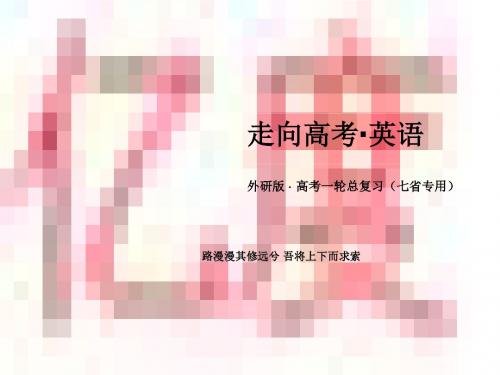
(Ⅳ)教材设问 1.Researchers were ________ from all over China to develop the new system. A.brought up C.put up
答案:B
B.brought in D.put in
2.As ________ result of Yuan Longping's discoveries Chinese rice production rose by 47.5 percent in ________ 1990's. A.the; the C.a; the
典句仿写 根据下面句式仿写句子 ①the key to(doing) sth.做某事的关键;开……的钥匙 仿写:记忆大量的单词是提高你的英语的关键。 ____________________语+doing(作宾语补足语) 仿写: 因为缺少资金的支持(financial support), 我发现很 难使公司正常运行。 _________________________________________________
考题巧解
C 五分之二的表达式方式为:two fifths;谓
语和 land 保持一致。故选 C。
基础回顾
稳扎稳打 网络构建
(Ⅰ)单词速记 A.联想记忆法 1.support vt.& n. 支持→in support ________支持 2.export vt. & n. 出口→________vt. & n.进口 3.brief adj.简短的;简洁的→________brief 简言之 4.quantity n.数量→a large quantity ________大量的 5.escape vi.逃跑;逃避→escape ________从……逃跑 6.clear vi.(烟雾)消散→clear ________消散;散去
外研版必修四Module4教案Module 4 Great Scientists(1)
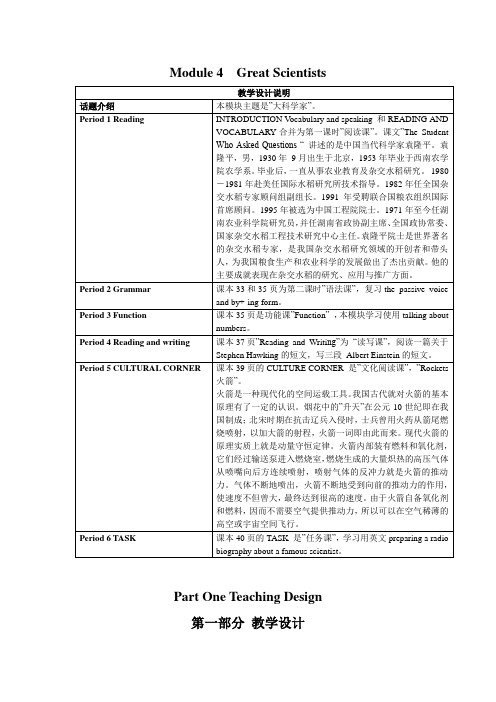
Module 4 Great ScientistsPart One Teaching Design 第一部分教学设计Period 1 Reading—The Student Who Asked Questions ■Goals●To learn to read passages with the passive voice and by+-ingabout great scientists●To learn to read with strategies■ProceduresStep 1: Warming up by defining sciencesBiochemistry: A branch of chemistry studying the chemicalbehavior in living beings. Biochemistry is not only interested in theindividual chemical components but also their vital interplay.Biology: the science that deals with living things. It is broadly divided into zoology, the study of animal life, and botany, the study of plant life. Subdivisions of each of these sciences include cytology (the study of cells), histology (the study of tissues), anatomy or morphology, physiology, and embryology (the study of the embryonic development of an individual animal or plant). Also included in biological studies are the sciences of genetics, evolution, paleontology, and taxonomy or systematic, the study of classification.Botany: the scientific study of plant life. As a branch of biology, it is also sometimes referred to as plant science(s) or plant biology. Botany covers a wide range of scientific disciplines that study the growth, reproduction, metabolism, development, diseases, and evolution of plants. Genetics: scientific study of the mechanism of heredity. While Gregor Mendel first presented his findings on the statistical laws governing the transmission of certain traits from generation to generation in 1856, it was not until the discovery and detailed study of the chromosome and the gene in the 20th cent that scientists found the physical basis of hereditary characteristics. Zoology: The original branches of zoology established in the late 19th century such as zoo-physics, bionomics have largely been subsumed into more broad areas of biology which include studies of mechanisms common to both plants and animals.Chemistry: the science of matter and its interactions with energy and itself (see physics, biology). Because of the diversity of matter, which is mostly in the form of atoms, chemists often study how atoms interact to form molecules and how molecules(分子) interact with each other.Physics: the science of Nature in the broadest sense. Physicists study the behavior and properties of matter in a wide variety of contexts, ranging from the sub-nuclear particles from which all ordinary matter is made (particle physics) to the behavior of the material Universe as a whole (cosmology宇宙论).Step 2: Before you readPlease go over the word list for this module, paying attention to the pronunciation of the word, the relationship between its pronunciation and its spelling.Step 3: While you read1. Type of writing and summaries of The Student Who Asked QuestionsType of writing A narrationIdea of 1st para. In the rice-growing world, the Chinese scientist, Yuan Longping, is a leading figure.3. Complete the article with one word in each blankThe Chinese scientist, Yuan Longping, is a _1_ figure in the rice-growing world. When he was educated in school he was given the _2_ , “the student who asks questions”. From an early age he was so interested in plants that he _3_agriculture in college. As a young teacher he began experimenting in crop breeding. First Yuan Longping _4_ with different types of rice. The results became known in China in 1966. Then he _5_ his search for a special type of rice plant. It had to be male. It had to be sterile. Finally, in 1970 a _6_sterile male rice plant was discovered. This was the breakthrough. As a _7 _of Yuan Longping’s discoveries Chinese rice production rose by 47.5 per cent in the 1990’s. There were other _8_, too. 50 thousand square kilometers of rice fields were converted to growing _9_and other cash crops. Following this, Yuan Longping’s rice was exported 1. What does “staple” mean in “In a hungry world rice is a staple food and China is the world’s largest producer”?A. chief or prominent among the products exported or produced by a country or district; chiefly orlargely dealt in or consumed.B. basic, chief, or principal: staple industries.C. principally used: staple subjects of conversation.D. important and outstanding2. He studied agriculture in college and as a young teacher he began experiments in _____.A. crop breedingB. feeding peopleC. sterile male riceD. with different types of rice3. He thought that the key to have more rice was by _____.A. experimenting with different types of riceB. asking questionsC. crossing different species of rice plantD. searching for a special type of rice plant4. Finally, in 1970 a _____ was discovered. This was the breakthrough.A. staple foodB. new plant which could give a higher yieldStep 4: After you read2. Speaking about Yuan Longping3. Read the text to transfer informationYou are going to read the text again and draw a diagram of it. You may use the diagram to retellPeriod 2 Grammar—Revision of the passive voice andby+-ing form■Goals●To rev iew the passive voice and by+-ing form■ProceduresStep 4: Absorb information concerning National College Entrance Examination1. In some parts of the world, tea ___ with milk and sugar. (1993NMET)A. is servingB. is servedC. servesD. served解析B 因为serve是及物动词,其动作承受者tea做主语,表示经常发生的情况,故用一般现在时的被动语态。
教案1:高中英语外研版 必修4 Module4 Great Scientists
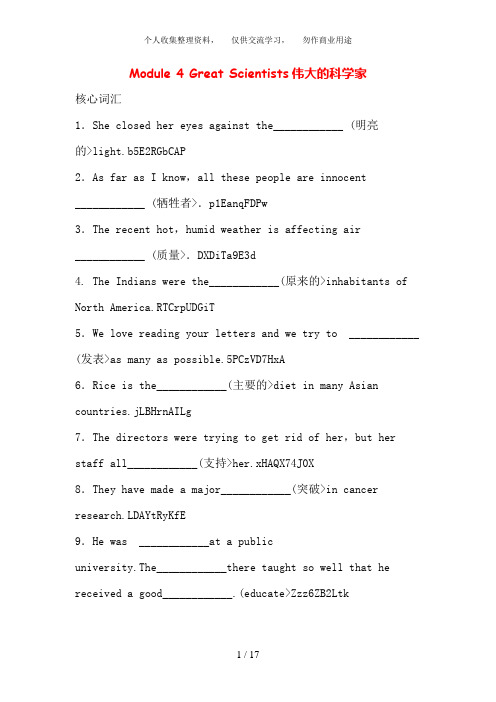
Module 4 Great Scientists伟大的科学家核心词汇1.She closed her eyes against the____________ (明亮的>light.b5E2RGbCAP2.As far as I know,all these people are innocent ____________ (牺牲者>.p1EanqFDPw3.The recent hot,humid weather is affecting air ____________ (质量>.DXDiTa9E3d4. The Indians were the____________(原来的>inhabitants of North America.RTCrpUDGiT5.We love reading your letters and we try to ____________ (发表>as many as possible.5PCzVD7HxA6.Rice is the____________(主要的>diet in many Asian countries.jLBHrnAILg7.The directors were trying to get rid of her,but her staff all____________(支持>her.xHAQX74J0X8.They have made a major____________(突破>in cancer research.LDAYtRyKfE9.He was ____________at a public university.The____________there taught so well that he received a good____________.(educate>Zzz6ZB2Ltk10.“In ____________,your work is bad,”said the boss ____________ .(brief>dvzfvkwMI11.brilliant2.victims3.quality4.original5.publish,6.staple7.supported8.breakthroughcated;educators;education 10.brief;brieflyrqyn14ZNXI高频短语1.________________ 培养;养育2.________________ 带进;引进;挣得3.________________ 由于……的结果4.________________ 因/以……而闻名/出名5.________________ 从……来;源于6.________________ 谋生7.________________ 掌权;执政8.________________ 对……进行实验9.________________ 偶然,意外地10.________________ 被系/捆在……上11.________________ 从……毕业12.________________ 被诊断为13.________________ 沿笔直的方向14.________________ 目前,现在1.bring up2.bring in3.as a result of4.be known for,e from6.make/earn/get a (one’s> livingeto/into power8.experiment with9.by accident 10.be attached to 11.graduate from 12.be diagnosed with 13.in a straight direction 14.at presentEmxvxOtOco重点句式1.In the________________,the Chinese scientist,Yuan Longping,is a________________.SixE2yXPq5在水稻种植领域,中国科学家袁隆平是一位杰出人士。
外研版高中英语必修四Module 4 Great Scientists 重难点知识点总结
外研版高中英语必修四Module 4 Great Scientists 重难点知识点总结【重点单词】1.biochemistry ['baɪəu'kemɪstri] n. 生物化学2.biology [baɪ'ɒlədʒi] n. 生物学3.botany ['bɒtəni] n. 植物学4.genetics [dʒə'netɪks] n. 遗传学5.zoology [zu'ɒlədʒi] n. 动物学6.staple ['steɪpl] adj. 主要的,重要的7.producer [prə'dju:sə] n. 生产者8.leading ['li:dɪŋ] adj. 主要的9.figure ['fɪɡə] n. 人物cate ['edjʊˌkeɪt] vt. 教育11.nickname ['nɪkˌneɪm] n. 绰号12.agriculture ['æɡrɪˌkʌltʃə] n. 农业13.breeding ['bri:dɪŋ] n. 培育14.species ['spi:ʃi:z] n.(动物或植物的)种15.yield [ji:ld] n. 产量16.original [ə'rɪdʒɪnəl] adj. 原来的;最初的17.publish ['pʌblɪʃ] vt. 出版18.sterile ['steraɪl] adj.(指生物)不孕育的;不结果实的19.breakthrough ['breɪkθru:] n. 突破20.support [sə'pɔ:t] vt. 支持21.production [prə'dʌkʃn] n. 产量22.convert [kən'vɜ:t] vt. 改变;转换23.export [ɪk'spɔ:t] vt. 出口24.hybrid ['haɪbrɪd] n. 杂交种25.agricultural [ˌæɡrɪ'kʌltʃərəl] adj. 农业的26.replace [rɪ'pleɪs] vt. 取代;以……代替27.quantity ['kwɒntəti] n. 数量28.quality ['kwɒləti] n. 质量29.best-seller [ˌbest'selə] n. 畅销书(或唱片等)30.cosmology [kɒz'mɒlədʒi] n. 宇宙生成学;宇宙论31.diagnose ['daɪəɡˌnəʊz] vt. 诊断32.victim ['vɪktɪm] n. 受害者33.brilliant ['brɪljənt] adj. 聪颖的;才华横溢的34.career [kə'rɪə] n. 生涯;经历35.brief [bri:f] adj. 简短的;简洁的36.partly ['pɑ:tli] adv. 部分地;在一定程度上37.physical ['fɪzɪkl] adj. 身体的38.graduate ['ɡrædʒuˌeɪt] vi. 毕业39.personal ['pɜ:sənl] adj. 个人的40.relativity [ˌrelə'tɪvəti] n. 相对论41.rocket ['rɒkɪt] n. 火箭lennium [mɪ'leniəm] n. 千年43.gunpowder [ɡʌnˌpaʊdə] n. 火药44.explosion [ɪk'spləʊʒn] n. 爆炸;爆炸声45.explode [ɪk'spləʊd] vi. 爆炸46.escape [ɪ'skeɪp] vi. 逃跑;逃避47.arrow ['ærəʊ] n.(弓)箭48.straight [streɪt] adj. 直的49.clear [klɪə] vi.(烟雾)消散【重点短语】1.experiment with sth. 用某物实验2.experiment on sth. 对某物进行实验3.carry out/perform/conduct an experiment 做实验4.make a breakthrough 取得重大突破(进展)5.convert A into/to B 把A转换成B6.take the place of 取代,代替7.instead of 代替,而不是8.bring up 抚育;教养;呕吐;提出(话题等)9.bring down 降低10.bring about 导致,引起11.bring back 归还;恢复;回想12.bring in 赚(钱);带进;传入13.search for 寻找14.search sb./someplace 搜查某人或某地15.in search of 寻求/寻找……16.as a result of 由于……的结果17.as a result 因此,结果18.owing to/thanks to 由于19.the key to… ……的关键20.export sth. to 出口某物到……21.the second most important 第二重要的22.be interested in… 对……感兴趣23.graduate from… 从……(地方)毕业24.escape from /out of someplace 从某地逃脱/逃走25.escape from reality 逃避现实26.have a narrow escape 九死一生27.a fire escape 紧急出口;安全门28.clear up (天气)放晴;整理;收拾29.be known for 因……而出名/闻名30.earn one’s living 谋生e to power 掌权;执政32.take power 取得政权33.It is possible that…. 可能……34.It’s certain that... 肯定……35.It’s likely that… 可能……36.It seems that... 好像……37.at war 在交战中38.be diagnosed with 被诊断出;患有39.become the voice of... 成为……的代言人40.partly because of 部分原因是【重点句型】1.She needs a high income to support such a large family.她需要一份高收入来养活这么一大家子。
外研版高中英语必修四Module 4Great ScientistsCulture Corner112张PPT课件ppt
7. The study of all living things biology biochemistry
Albert Eiinventiond/dis they invent
coveries
/discover?
relativity
In 1905
2 How were rockets invented?
The idea of rockets came from the discovery that the gas escaping from the tube could lift into the air
3 How were rockets used in the early stage?
•A , rockets can be used to send astronauts into space
•B , rockets can be used to burn fireworks
•C , rockets were used in 2000 Olympics .
Paragraph
• 1 Rockets w__e_re__ probablyi_n_ve_n_t_e_d_by a_c_c_i_d_e_n_t _about __2_0_0_0__ years ago.
Paragraph
• Everyone wanted to use rockets in battles.
• Wan Hu became the world’s first astronaut?
1 When and where were rockets invented?
2 How were rockets invented?
3
英语必修ⅳ外研版module4greatscientists教案
Module 4 Great Scientist教学设计教材版本:外研版(Book 4)模块:Book 4 Module 4教学设计时段:本单元第2课时 Reading and Vocabulary教学课型:阅读理解课教材分析:本模块以 Great Scientist为话题,通过教学使学生了解古今中外不同领域的科学家的生平经历及他们的卓越贡献,阅读袁隆平和Stephen Hawking 的事迹,使学生树立正确的人生观、价值观。
并根据学生的已有知识,指导学生发表对伟大科学家的了解和看法。
本课阅读内容描写了“杂交水稻之父”袁隆平的生平和事迹,并阐述了他从事这项工作的重要性和所取得的成就。
激励他们树立远大理想,奋发图强。
学情分析:本模块是第4册第4单元,学生已经学了4册书,学生可以用英语进行对本单元的话题进行讨论和发表自己的观点。
教学目标:一、语言目标1、词汇和短语Staple, producer, leading, figure, educate, agriculture, breeding, species, original, publish, sterile, breakthrough, support, production, convert, export, hybrid, quality, quantity, bring up, as a result of, cash crop2、重点句子(1)In the rice-growing world, the Chinese scientist, Yuan Longping, is a leading figure.(2)He thought there was only one way to this ---by crossing different species of rice plant, and then he could produce a new plant which could give a higher yield than either of the original plants.(3)As a result of Yuan Longping’s discoveries Chinese rice production rose by 47.5 perc ent in the 1990’s二、能力目标1、Enable students to talk about “the father of hybrid rice—Yuan Longping”2、Understand the text answer the related questions.3、Enable the students to understand the details about the passage, choosingthe correct answer according to the text and fill in the form about the passage.三、学能目标Help students learn how to talk about Yuan Longping and his achievements. 教学重点:1 Talk about “the father of hybrid rice---Yuan Longping”When and where was he born?Why was he famous?What did he discover?How important is the discovery?2 Discuss the question of comprehension:Why is Yuan Longping’s discovery very important?教学难点:1 Understand the importance of scientists’ achievements.2 Discuss the questions:What would you think of the new hybrid rice if you are a rice farmer? Explain why.Is the title of the passage suitable? If not, write a new one and give the reasons.3 Discuss what the students can learn from Yuan Longping.教学方法:1 Skimming and scanning2 Asking- and- answering activity in understanding the text.3 Discussion.Teaching procedures(教学过程):Step One Warming upShow the students some pictures of great scientists and ask them to talk about who they are and what achievements they had. Then show some pictures of Yuan Longping. Ask the students if they know something about him.(首先在屏幕上呈现一些著名科学家的图片,让学生讨论是否他们了解这些科学家,其目的是导入我国著名的科学家袁隆平这一话题)Step Two Reading1 ScanningGet the students to comprehend the passage quickly. Tell the students to look through the whole passage to get the general ideas of the passage. Encourage the students to express their different opinions in English. Then ask the students to look at the title of the passage. Ask the students if the title of the passage is suitable. If not, write a new one and give the reasons. Ask them to discuss with their partners.(这一环节目的是让学生快速阅读课文并了解文章大意,讨论文章的标题是否合适,可用什么标题来替换)2 Choose the best answer.(1)How could he manage to produce more ricequickly ?A.By crossing different species of rice plantB.By planting more riceC.By bringing in rice from other countriesD. By doing more experiments(2)The last two paragraphs mainly talk about___.A.China’s agriculture developmentB.Yuan Longping’s elderly lifeC.foreign countries’s agriculture revolutionD. Yuan Longping’s contributions to China and the world’s population (在屏幕上呈现以上的选择问题,检测学生是否了解文章大意)3 Find out the topic sentences.Para 1 Yuan Longping is a leading figure in the rice-growing world.Para 2 As a boy, he was called “the student who asked questions”.Para 3 As a young teacher, he began experiments in crop breeding.Para 4 He discovered a special type of rice.Para 5 His discoveries increased Chinese rice production.Para 6 The yield of the new hybrid rice is much greater than that of other types grown in Pakistan.(通过寻找The topic sentences的活动,让学生进一步的阅读和理解文章大意)4Read the passage again and judge the statements True of False.(1) China produces more rice than any other country.(2) Yuan Longping asked a lot of questions at school.(3) He developed a new kind of fast-growing rice.(4) The government helped him in his research.(5) The new rice replaced vegetables in 50 thousand square kilometers.(6) The new rice is now grown in other countries, such as Pakistan.(本环节目的是通过True or False questions 的练习使学生加深对课文的理解)5 Fill in the blank.Yuan Longping is a leading figure in the __________ world. As a boy, he was called “the student who asks question” . As a young teacher, he began _________ in crop ________. He thought that the ___ to feeding people was to have more rice and to produce it more quickly. In 1970 a naturally male rice plant was discovered. This was the ___________. As a result of this, Chinese rice production rose __47.5percent. The _____of the new rice is much greater than that of other types of rice grown in Pakistan.(这一项练习目的是帮助学生更好的了解袁隆平的生平与他的贡献,通过本项练习,指导学生如何进行课文的复述,这也是这一节课教学所要达到的能力目标之一。
外研社必修4 Module4 Reading Great Scientists
living things
__b_i_o_ch__em__i_st_r_y_
6. the study of the structure of substances(物质)
and how they react with(反应) each other
_c_h_e_m__is_t_r_y
7. the study of inherited(遗传的) characteristics
Match the words and definitions.
biochemistry biology botany chemistry genetics physicsanimals
_z_o_o_lo_g_y_
2. the study of plants
"天将降大任于斯人也, 必先苦其心志,劳其筋骨, 饿其体肤,空乏其身"
When Heaven is about to place a great responsibility on a great man, it always first frustrates his spirit and will, exhausts his muscles and bones, exposes him to starvation and poverty."
_b_o_t_a_n_y_
3. the study of all living things _b_i_o_lo_g_y_
4. the study of physical objects(物体) and
natural forces
_p_h_y_s_i_c_s
5. the study of chemical processes(过程) in
- 1、下载文档前请自行甄别文档内容的完整性,平台不提供额外的编辑、内容补充、找答案等附加服务。
- 2、"仅部分预览"的文档,不可在线预览部分如存在完整性等问题,可反馈申请退款(可完整预览的文档不适用该条件!)。
- 3、如文档侵犯您的权益,请联系客服反馈,我们会尽快为您处理(人工客服工作时间:9:00-18:30)。
6. which helped keep the rocket moving...是which 引导 的定语从句,修饰a long stick, which 在从句中作主语。
7. it is possible that ...是可能的。 it 是形式主语, 真正的主语是that 后面的从句
• 5.No matter how much you may dislike the adverts, there’s no way to ________ them in an age of globalization.
答案:escape 句意:不论你多么不喜欢广告,在这个全球化的 时代,没有办法能够逃避它们。escape“逃避,逃脱”,符合句 意。
The history rockets
火箭是中国古代的重大发明之一。公元969年,中国已经发明了火药(火药是在 唐朝发明的)。北宋军官岳义方、冯继升造出了世界上第一个以火药为动力的 飞行兵器——-火箭。这种火箭由箭身和药筒组成,其中药筒用竹、厚纸制成, 内充火药,前端封死,后端引出导火绳,点燃后,火药燃烧产生的气体向后喷 出,以气体的反作用力把火箭推向前,飞行中杀伤敌兵。这种最早的原始火箭 在工作原理上与现代火箭没有什么不同。公元12世纪中叶,原始的火箭经过改 进后,广泛地用于战争。如公元1161年宋军与金兵的“采石之战”中所使用的 “霹雳炮”,其实就是一种火箭兵器。当时在中国民间广为流行的能高飞的 “火流星”(亦称“起火”),实际就是世界上第一种观赏性火箭。元、明之 后,即公元13世纪以后,中国的火箭兵器在战争中有了很大发展,涌现了许多 与现代火箭类型相近的火箭形式。13世纪中叶,蒙古人入侵中亚、西亚和欧洲, 阿拉伯人侵略西班牙,他们把中国的火箭技术传入了欧洲及世界其它地区。到 了这时,德意志的艾伯特斯·麦格诺才在欧洲首次记述了关于制作火箭的技术。 欧洲人最早使用火箭兵器,是在1379年意大利的帕多亚战争和1380年的威尼斯 之战中。
jump out of
从...中跳出来
escape from...从...中逃跑 escape (doing) sth 逃脱做某事
which was put in bamboo tubes...是which引导 的定语从句,修饰gunpowder, which 在从句中 作定语
The Chinese discovered that the gas escaping from the tube...
• —But I’m sure it won’t interest ________. 答案:everybody 本题考查部分否定的用法。由转折词but可 知:尽管你认为那是一部最有趣的电影,但它并不一定令每一个 人都感兴趣。not everybody“并非每一个人”。
• 3.The secret was cleared________ when he admitted he had been there all the time. 答案:up 句意:当他承认他一直在那儿的时候,秘密就揭 开了。clear up“消除(误会、疑虑)等”,符合句意。 • 4.The bomb ________(explode) at 10:15 a.m. and killed 16 persons altogether. 答案:exploded 句意:炸弹在上午10:15爆炸,总共造成 16人死亡。explode“爆炸”,由句意可知用一般过去时。
8. which could travel over the surface of water and hit an enemy ship 是which引导的定语从 句,修饰a rocket.
Para 4
not everybody 并不是 所有人 表示部分否定
light-lit-lit v.点燃
clouds of 一团,一大片
Read the passage and answer the following questions:
1. How were rockets invented?
2. What are they used for today?
Para 1
advanced adj. 先进的
send...into space 把...送到太空
• 7.Born in Beijing, Yuan Longping graduated________ Southwest Agricultural College in China in 1953. 答案:from 考查固定短语。graduate from“毕业 于……”。
• 8.The fireworks didn’t go upwards ________ a straight direction but exploded at the spot. 答案:in direction“方向,方位”,常和介词in搭配。
不知道自己缺点的人,一辈子都不会想要改善。成功的花,人们只惊慕她现时的明艳!然而当初她的芽儿,浸透了奋斗的泪泉,洒遍了牺牲的血雨。成功的条件在于勇气和自信,而勇气和自 信乃是由健全的思想和健康的体魄而来。成功了自己笑一辈子,不成功被人笑一辈子。成功只有一个理由,失败却有一千种理由。从胜利学得少,从失败学得多。你生而有翼,为何一生匍匐 前进,形如蝼蚁。你一天的爱心可能带来别人一生的感谢。逆风的方向,更适合飞翔。只有承担起旅途风雨,才能最终守得住彩虹满天只有创造,才是真正的享受,只有拚搏,才是充实的生 活。知识玩转财富。志不立,天下无可成之事。竹笋虽然柔嫩,但它不怕重压,敢于奋斗、敢于冒尖。阻止你前行的,不是人生道路上的一百块石头,而是你鞋子里的那一颗石子。最凄美的 爱,不必呼天抢地,只是相顾无言。最值得欣赏的风景,是自己奋斗的足迹。爱的力量大到可以使人忘记一切,却又小到连一粒嫉妒的沙石也不能容纳。生活不可能像你想的那么美好,但也 不会像你想的那么糟。时间告诉你什么叫衰老,回忆告诉你什么叫幼稚。不要总在过去的回忆里缠绵,昨天的太阳,晒不干今天的衣裳。实现梦想往往是一个艰苦的坚持的过程,而不是一步 到位,立竿见影。那些成就卓越的人,几乎都在追求梦想的过程中表现出一种顽强的毅力。世界上唯一不变的字就是“变”字。事实胜于雄辩,百闻不如一见。思路决定出路,气度决定高度, 细节决定成败,性格决定命运虽然你的思维相对于宇宙智慧来说只不过是汪洋中的一滴水,但这滴水却凝聚着海洋的全部财富;是质量上的一而非数量上的一;你的思维拥有一切宇宙智慧。 所有过不去的都会过去,要对时间有耐心。人总会遇到挫折,总会有低潮,会有不被人理解的时候。如果你希望成功,以恒心为良友,以经验为参谋,以小心为兄弟,以希望为哨兵。如果一 个人不知道他要驶向哪个码头,那么任何风都不会是顺风。沙漠里的脚印很快就消逝了。一支支奋进歌却在跋涉者的心中长久激荡。上天完全是为了坚强你的意志,才在道路上设下重重的障 碍。拥有资源不能成功,善用资源才能成功。小成功靠自己,大成功靠团队。炫耀什么,缺少什么;掩饰什么,自卑什么。所谓正常人,只是自我防御比较好的人。真正的心理健康,是不设 防而又不受害。学习必须如蜜蜂一样,采过许多花,这才能酿出蜜来态度决定高度。外在压力增加时,就应增强内在的动力。我不是富二代,不能拼爹,但为了成功,我可以拼命!我会努力 站在万人中央成为别人的光。人一辈子不长不短,走着走着,就进了坟墓,你是要轰轰烈烈地风光下葬,还是一把骨灰撒向河流山川。严于自律:不能成为自己本身之主人者,将永远成不了 他周围任何事物的主人。自律是完全拥有自己的内心并将其导向他所希望的目标的惟一正确的途径。生活对于智者永远是一首昂扬的歌,它的主旋律永远是奋斗。眼泪的存在,是为了证明悲 伤不是一场幻觉。要不断提高自身的能力,才能益己及他。有能力办实事才不会毕竟空谈何益。故事的结束总是满载而归,就是金榜题名。一个人失败的最大原因,是对自己的能力缺乏充分 的信心,甚至以为自己必将失败无疑。一个人炫耀什么,说明内心缺少什么。一个人只有在全力以赴的时候才能发挥最大的潜能。我们的能力是有限的,有很多东西飘然于我们的视野与心灵 之外。过去再优美,我们不能住进去;现在再艰险,我们也要走过去!即使行动导致错误,却也带来了学习与成长;不行动则是停滞与萎缩。你的所有不甘和怨气来源于你的不自信和没实力。 你可以平凡,但不能平庸。懦弱的人只会裹足不前,莽撞的人只能引为烧身,只有真正勇敢的人才能所向披靡。平凡的脚步也可以走完伟大的行程。平静的湖面锻炼不出精悍的水手;安逸的 生活打造不出生活的强者。人的生命似洪水在奔流,不遇着岛屿、暗礁,难以激起美丽的浪花人生不怕重来,就怕没有将来。人生的成败往往就在于一念之差。人生就像一个动物园,当你以 为你在看别人耍猴的时候,却不知自己也是猴子中的一员!人生如天气,可预料,但往往出乎意料。人生最大的改变就是去做自己害怕的事情。如果不想被打倒,只有增加自身的重量。如果 你向神求助,说明你相信神的能力;如果神没有帮助你,说明神相信你的能力。善待自己,不被别人左右,也不去左右别人,自信优雅。活是欺骗不了的,一个人要生活得光明磊落。生活真 象这杯浓酒,不经三番五次的提炼呵,就不会这样一来可口!生命不止需要长度,更需要宽度。时间就像一张网,你撒在哪里,你的收获就在哪里。世上最累人的事,莫过于虚伪的过日子。当 你感到痛苦时,就去学习点什么吧,学习可以使我们减缓痛苦。当世界都在说放弃的时候,轻轻的告诉自己:再试一次。过错是暂时的遗憾,而错过则是永远的遗憾!很多事情努力了未必有 结果,但是不努力却什么改变也没有。后悔是一种耗费精神的情绪后悔是比损失更大的损失,比错误更大的错误所以不要后悔。环境不会改变,解决之道在于改变自己。积极向上的心态,是 成功者的最基本要素。激情,这是鼓满船帆的风。风有时会把船帆吹断;但没有风,帆船就不能航行。即使道路坎坷不平,车轮也要前进;即使江河波涛汹涌,船只也航行。经验是由痛苦中 粹取出来的。浪费时间等于浪费生命。老要靠别人的鼓励才去奋斗的人不算强者;有别人的鼓励还不去奋斗的人简直就是懦夫。不要问别人为你做了什么,而要问你为别人做了什么。要有最 遥远的梦想和最朴素的生活,即使明天天寒地冻,金钱没有高贵,低贱之分。金钱在高尚人的手中,就会变得高尚;金钱在庸俗人手中,就会变得低级庸俗。涓涓细流一旦停止了喧哗,浩浩 大海也就终止了呼吸。漫无目的的生活就像出海航行而没有指南针。如果我没有,我就一定要,我一定要,就一定能。上一秒已成过去,曾经的辉煌,仅仅是是曾经。其实我们往往失败不是 在昨天,而是失败在没有很好利用今天。千万人的失败,都有是失败在做事不彻底,往往做到离成功只差一步就终止不做了。强者征服今天,懦夫哀叹昨天,懒汉坐等明天。墙高万丈,挡的 只是不来的人,要来,千军万马也是挡不住的。求人不如求己;贫穷志不移;吃得苦中苦;方为人上人;失意不灰心;得意莫忘形。人们总是在努力珍惜未得到的,而遗忘了所拥有的。时间 告诉我,无理取闹的年龄过了,该懂事了。时间是个常数,但也是个变数。勤奋的人无穷多,懒惰的人无穷少。手莫伸,伸手必被捉。党与人民在监督,万目睽睽难逃脱。汝言惧捉手不伸,他道 不伸能自觉,其实想伸不敢伸,人民咫尺手自缩。思考是一件最辛苦的工作,这可能是为什么很少人愿意思考的原因。我们不能成为贵族的后代,但我们可以成为贵族的祖先。我已经看见,多 年后的自己。自信!开朗!豁达!无论现在的你处于什么状态,是时候对自己说:不为模糊不清的未来担忧,只为清清楚楚的现在努力。无人理睬时,坚定执着。万人羡慕时,心如止水。无 志者常立志,有志者立常志,咬定一个目标的人最容易成功。心随境转是凡夫,境随心转是圣贤。学会以最简单的方式生活,不要让复杂的思想破坏生活的甜美。要无条件自信,即使在做错 的时候。一个人能走多远,要看他有谁同行;一个人有多优秀,要看他有谁指点;一个人有多成功,要看他有谁相伴。成功在优点的发挥,失败是缺点的累积。从绝望中寻找希望,人生终将 辉煌。当你跌到谷底时,那正表示,你只能往上,不能往下!当你决定坚持一件事情,全世界都会为你让路。贫穷本身并不可怕,可怕的是贫穷的思想,以及认为自己命中注定贫穷。一旦有 了贫穷的思想,就会丢失进取心,也就永远走不出失败的阴影请享受无法回避的痛苦。人的一生就是体道,悟道,最后得道的过程。人生就是一万米长跑,如果有人非议你,那你就要跑得快 一点,这样,那些声音就会在你的身后,你就再也听不见了。人生就像一杯没有加糖的咖啡,喝起来是苦涩的,回味起来却有久久不会退去的余香。人生可如蚁而美如神。人生是各种不同的 变故、循环不已的痛苦和欢乐组成的。那种永远不变的蓝天只存在于心灵中间,向现实的人生去要求未免是奢望。是我们不认识自己的智慧,不明白自己拥有全宇宙的力量。最巨大的遗憾, 是被命运安排!做好自己其他的让别人说去吧!成功不是凭梦想和希望,而是凭努力和实践成功就是简单的事情不断地重复做。荆棘的存在是为了野草不轻易地任人践踏。马行软地易失蹄, 人贪安逸易失志没有目标的人永远为有目标的人去努力。没有人可以做你的双拐,你必须学会独立去闯荡。每天叫醒自己的不是闹钟,而是梦想。能把在面前行走的机会抓住的人,十有八九 都会成功。你既然认准一条道路何必去打听要走多久!你可以选择这样的“三心二意”:信心、恒心、决心;创意、乐意。你若花开,蝴蝶自来。盆景秀木正因为被人溺爱,才破灭了成为栋梁之 材的梦。潜龙怎能久卧于深水,勤奋,是步入成功之门的通行证。
